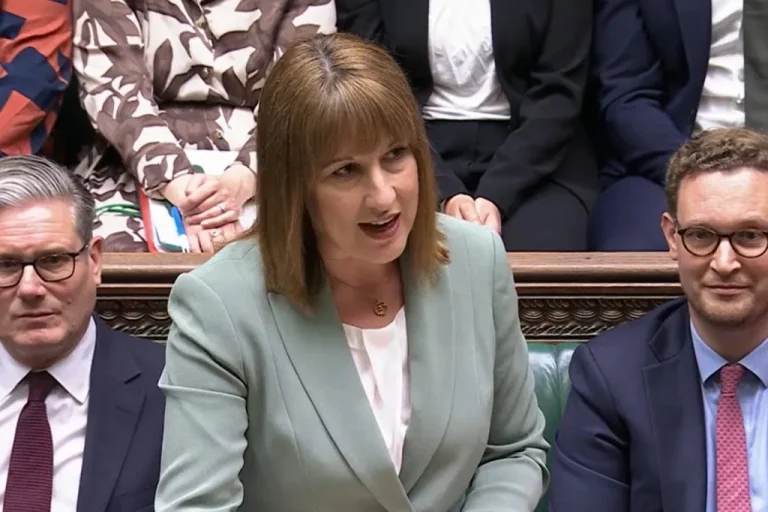The chancellor has said she is “hugely grateful” for the work that nurses do, as she announced extra funding for the NHS.
In her spending review today, Rachel Reeves pledged a “record cash investment” in England’s health service.
“I am hugely grateful to our nurses, our doctors, our paramedics and other healthcare professionals for everything that they do”
Rachel Reeves
The review will provide a 2.7% real-terms uplift per year to the day-to-day spending budget for health and social care between 2023-24 and 2028-29, from £177.9bn to £232bn.
As part of that, England’s NHS will see a 3% boost, from £171bn to £226.1bn.
Meanwhile, between 2023-24 and 2029-30, health and social care’s capital budget will rise by 3.2% in real terms, from £10.5bn to £14.6bn.
In her speech to parliament, Ms Reeves said: “People rightly expect an NHS that is there when they need it, an ambulance that comes when they call one, a GP appointment available when they need one, a scan that is performed when they are referred for one.
“I am hugely grateful to our nurses, our doctors, our paramedics and other healthcare professionals for everything that they do.
“If we want a strong economy where working people can fulfil their potential, then we must have a strong NHS.”
The spending review document flagged specific investment being made in NHS technology and digital transformation, smoking cessation programmes and in training more GPs.
“These investments will enable the delivery of our upcoming 10-Year Plan for Health and put the NHS firmly back on the path to renewal,” added Ms Reeves.
However, alongside the extra funding, the NHS will be expected to achieve 2% productivity growth per year over the next three years.
In her speech, Ms Reeves noted how her government had agreed to implement pay review recommendations for nurses and others.
“Nursing staff will see the NHS being protected but not transformed by today’s spending plans”
Nicola Ranger
By doing this, she said she was “giving public sector workers the fair pay rises that they deserve”.
Nurses are due to be getting less than other public sector workers as a result of these deals.
Meanwhile, the budget document stated that the spending review “allows for an increase of over £4bn of funding available for adult social care in 2028-29, compared to 2025-26”.
“This will support the sector to improve adult social care provision, with further details to be set out shortly,” it added, citing the review of adult social care being led by Baroness Louise Casey.
Responding to the spending review, the Royal College of Nursing (RCN) said the investment in the NHS was welcome but warned that it may not be enough to deliver the reforms the government was aiming for.
RCN general secretary and chief executive Professor Nicola Ranger said: “Against a backdrop of other cuts, nursing staff will see the NHS being protected but not transformed by today’s spending plans.
“The chancellor acknowledged the contribution of nursing staff, but the reality is patient demand is rising and the nurse workforce crisis is deepening.
“Ambition and the funding to match is required from government if its flagship reforms are to be successful.”
For example, she warned that moving more care from hospitals to the community – one of the government’s three big shifts for the NHS – would require “significant investment” in nursing.
In regards to pay, Professor Ranger noted that her members would soon “give their verdict” on whether the 2025-26 NHS pay deal is good enough, via the ballot that it is currently running.
Also responding, Sarah Woolnough, chief executive of health think tank the King’s Fund, said much of the additional investment would be “absorbed” by costs such as the rising price of medicines and covering the NHS pay deals.
She also warned that the increase in capital budget was “nowhere near enough” to fix the NHS’ worn-out estates and develop the new facilities needed to deliver reform.
“But there is a huge opportunity offered by the government’s upcoming 10-year plan for health, so we will wait to see how this money will be translated into better, more efficient services,” she added.
Jennifer Dixon, chief executive of the fellow think tank Health Foundation, noted how the 2% productivity targets set out for the NHS was a “huge ask”.
She said NHS budgets would remain “tight” despite the increases in funding.
Similarly, the chief executive of NHS Providers, Daniel Elkeles, welcomed the fact that the health service was “front and centre” of the spending review but questioned whether the funding was enough to deliver the transformations expected.
“We need to have an honest conversation about what the NHS can deliver now and in the future,” he said.
In addition, he warned that social care had “once again” not been given the attention it deserved.
“Leaving patients and the public without appropriate care is a significant blocker on progress for the NHS,” he added.

